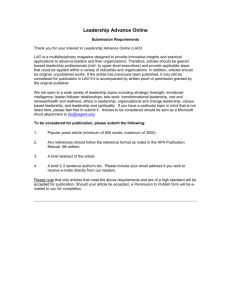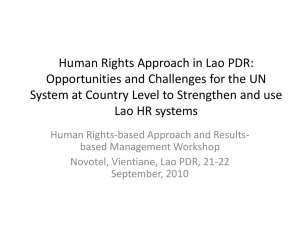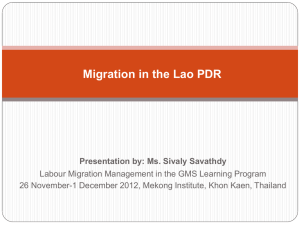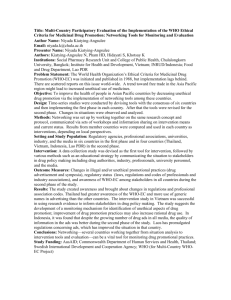Why Need RTA's? Case Study of Successful Global FTAs
advertisement
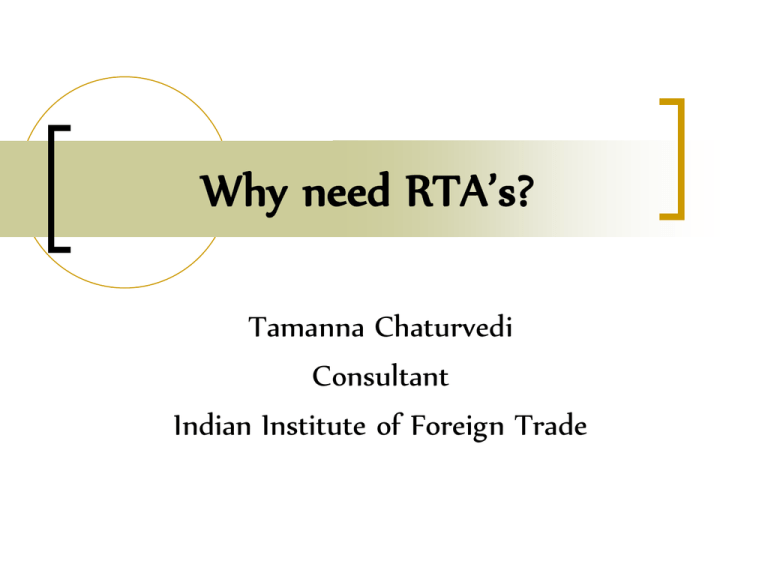
Why need RTA’s? Tamanna Chaturvedi Consultant Indian Institute of Foreign Trade Why should Thailand or China trade with CLMV countries: case of China and Vietnam 6t 1t 1m 3m kgs/man hr kgs/man hr Ch. had absolute advantage over Vietnm in prod of tea (sp in tea and no mngoes) Vietnm has absolute advantage over Ch. in prod of mngoes( sp in mngoes and no tea China will sell 6 kgs tea to Vietnam Take 3kgs mango in return China would exchange 6kgs of tea with 3kgs of mango from Vietnam and both countries would gain..……...how? If China would have dedicated its one man hour in producing mangoes it would have produced 1M. Now its diverting that labour to production of tea hence can produce 6 kgs of tea in one hour and exchange it with 3kgs of mango from Vietnam thereby gaining 2m (3m-m) To produce 6 kgs of tea, Vietnam would be req. 6 manhrs. If these 6 manhrs are diverted from tea to mangoes, Vietnam can produce 18mangoes. Out of this 3 mangoes are exchanged with China and Vietnam still have an advantage of 15 mangoes. Case of Thailand and Lao PDR 6s 1s 3r 2r kgs/man hr bushels/man hr Oops….Thailand had absolute advantage over Lao PDR in prod of both sugar and rice Let’s analyze two country’s position….. Lao’s position: Lao has absolute disadvantage with respect to Thailand in both sugar and rice. Lao has relatively less disadvantage in rice than in sugar.Or Lao has comparative adv wrt Thailand in rice & comparative disadvantage in sugar. Thailand’s position: Thai has absolute advantage with respect to Lao in both sugar and rice It has relatively more advantage in sugar (6:1) than rice (3:2) Thai has comparative advantage over Lao in sugar and comparative disadv in rice. Can a business deal still crack? ……..lets see how? Thailand sp in sugar and Lao in rice. Thai exchanges 6s for 6r with Lao Thailand’s position Thai gains 3r by only producing sugar and no rice Lao’s position If Lao would not have taken 6s from Thai, it would have req 6 manhrs to produce that. This 6 hrs if dedicated to produce rice, it can produce 6*2=12r Out of this 6r is given to Thai and still have advantage of 6r. Case of Thailand and Lao PDR 6s 1s 3r 2r kgs/man hr bushels/man hr Thailand had absolute advantage over Lao PDR in prod of both sugar and rice What is it after all? WTO GENESIS The General Agreement on Trade and Tariff (GATT) came into existence in 1947 It sought substantial reduction in tariff and other barriers to trade and to eliminate discriminatory treatment in international commerce. Eight rounds of negotiations had taken place during five decades of its existence. 23 Countries came together to form GATT Were you there? 1. 2. 3. 4. 5. 6. 7. 8. 9. 10. 11. 12. Australia Belgium Brazil Burma (now Myanmar) Canada Ceylon (now Sri Lanka) Chile, China Cuba Czechoslovakia France India 13 Lebanon 14 Luxembourg 15 The Netherlands 16 New Zealand 17 Norway 18 Pakistan 19 Zimbabwe 20 21 22 23 Syria South Africa United Kingdom United States Eight rounds of GATT…..WTO.. How different was it? Agriculture Textiles and Clothing Services UR 1986-93 Tokyo 1973-79 Kennedy 1964-67 Dhillon 1960-61 Geneva Round 1956 Torquay Round 1951 Annecy Round 1949 Geneva Round 1947 TRIPS Dispute Settlement Some factS… The World Trade Organization (WTO) is the only global international organization dealing with the rules of trade between nations. Location Established Created by Membership Head Secretariat staff : : : : : : Geneva, Switzerland 1 January 1995 Uruguay Round negotiations 153 countries Pascal Lamy (DG) 550 WTO Journey of GMS Country Thailand & Myanmar1995 China: 2001 Cambodia: 2003 Lao: Vietnam: 2006 Observer Status Countries 1. 2. 3. 4. 5. 6. 7. 8. 9. 10. 11. Afghanistan Algeria Belarus Bhutan Bosnia Ethipoia Iran Iraq Kazakastan Lao PDR Libya 12. 13. 14. 15. 16. 17. 18. 19. 20. 21. Russian Federation Saudi Arabia Serbia Seychelles Sudan Tazakistan Tonga Ukraine Uzbekistan Yemen Application Working Party Established Number of Working Party Meetings * Draft Working Party Report ** Afghanistan Nov 2004 Dec 2004 Algeria Jun 1987 Jun 1987 9 Jun 2006 Andorra Jul 1997 Oct 1997 1 Azerbaijan Jun 1997 Jul 1997 4 Bahamas May 2001 Jul 2001 Belarus Sep 1993 Oct 1993 7 Apr 2005 (FS) Bhutan Sep 1999 Oct 1999 3 Aug 2005 (FS) Bosnia and Herzegovina May 1999 Jul 1999 2 Cape Verde Nov 1999 Jul 2000 3 Nov 2005 Ethiopia Jan 2003 Feb 2003 Iran Jul 1996 May 2005 Iraq Sep 2004 Dec 2004 Kazakhstan Jan 1996 Feb 1996 9 Sep 2006 Lao People's Democratic Republic Jul 1997 Feb 1998 2 Lebanese Republic Jan 1999 Apr 1999 4 Libyan Arab Jamahiriya Jun 2004 Jul 2004 Dec 2005 (FS) BASIC PRINCIPLES 1. NON-DISCRIMINATION MFN (Most Favored Nation) Members are bound to grant to the products of other members treatment not less favorable than that accorded to the products of any other country. National Treatment Once goods have cleared customs, imported goods must be treated no less favorably than the equivalent domestically produced goods. 2. PREDICTABLE AND GROWING ACCESS TO THE MARKETS 3. Prohibition of Quantitative Restrictions Binding of Tariffs Bound Tariffs cannot be increased Progressive reduction in the protection. Exceptions: Safeguards, BOP. FAIR COMPETITION 4. TRANSPARENCY 5. ENCOURAGE DEVELOPMENT STRUCTURE OF WTO Dispute Settlement Panel Apellate Body Council for Trade in Goods - Textiles Monitoring Body - Committee on safeguards - Committee on Import Licensing - Committee on Anti Dumping Practices - Committee on Technical Barriers to Trade - Committee on Customs Valuation - Committee on Subsidies & Countervailing measures - Committee on Rules of Origin - Committee on Trade related Investment Measures - Committee on Sanitary & Phytosanitary Measures - Committee on Agriculture - Committee on Market Access Dispute Settlement Body Committee on Trade & Environment Trade and Development BOP MINISTERIAL CONFERENCE General Council Budget Finance & Administration Trade Policy Review Body Trade in Civil Aviation Council for Trade in Services - Working party on professional services - Committee on Trade in Financial Services - NG on Maritime Transport Services - NG on Movement of Natural Persons - NG on Basic Telecommunications Council for TRIPS Government procurement International Dairy Council International Meat Council Ministerial conferences Hong Kong, 13-18 December 2005 Cancún, 10-14 September 2003 Doha, 9-13 November 2001 Seattle, November 30 – December 3, 1999 Geneva, 18-20 May 1998 Singapore, 9-13 December 1996 Annex 1-A: Agreement on Trade in Goods 1. 2. 3. 4. 5. 6. 7. 8. 9. 10. Agreement Agreement Agreement Agreement Agreement Agreement Agreement Agreement Agreement Agreement on on on on on on on on on on Agriculture SPS Measures Textiles & Clothing Technical Barriers to Trade Trade related Investment Measures Pre Shipment Inspection Rules of Origin Import Licensing procedure SCM Safeguards Ministerial conferences Hong Kong, 13-18 December 2005 Cancún, 10-14 September 2003 Doha, 9-13 November 2001 Seattle, November 30 – December 3, 1999 Geneva, 18-20 May 1998 Singapore, 9-13 December 1996 Singapore, 9-13 December 1996 Review of first two years of work Setting up of working groups International investment Competition policy Transparency in Govn procurement Trade facilitation Geneva, 18-20 May 1998 Celebration of 50 years of GATT First negative views expressed (Asian financial crises) Developed countries interest Discussion of trade and environment Labour standards Seattle, November 30 – December 3, 1999 Divisions between rich and poor nations become most obvious Violent anti-WTO protests by NGOs Many country ministers actually walked out of the negotiations, leading to an early end to the conference with nothing of value achieved Doha, 9-13 November 2001 Decisions taken at Doha related to the concerns of developing countries Doha Development Agenda negotiations to clarify or revise anti-dumping rules; transparency in government procurement, investment and competition policy. TRIPs not being allowed to be an impediment to public health in poorer countries Cancún, 10-14 September 2003 Foreign investors (developing countries feared their industries will be controlled by foreign multinationals) Transparency in government purchasing (developing countries feared this might help foreign companies win public sector business) Trade facilitation -- making things like customs procedures simpler Cancún, 10-14 September 2003 WTO rules in short….. 1. 2. 3. 4. 5. The WTO does NOT tell governments what to do The WTO is NOT for free trade at any cost Weaker countries do have a choice, they are NOT forced to join the WTO The WTO is NOT only concerned about commercial interests. This does NOT take priority over development The WTO is NOT undemocratic Then why countries went into signing RTA’s?
